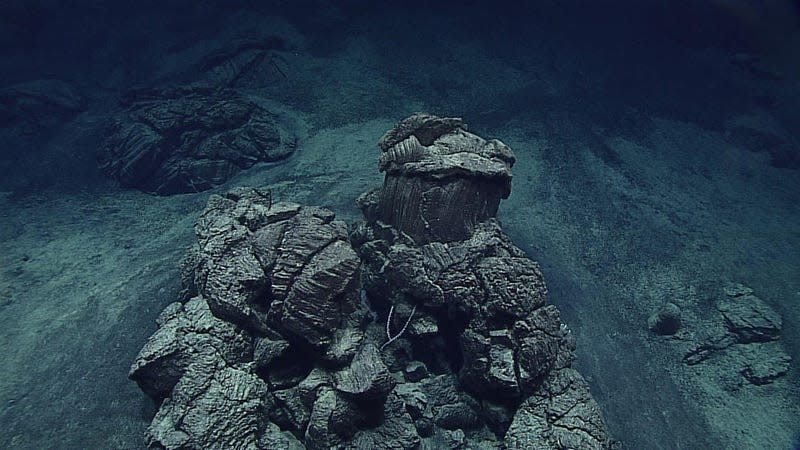Deepest Virus Ever Detected Unearthed by Scientists in the Mariana Trench

An isolated pillow outcrop surrounded by sediment found during a 2016 expedition to the bottom of the Mariana Trench.
In new research this week, scientists say they’ve unearthed a viral denizen from the depths of the Mariana Trench. The virus is believed to be the deepest of its kind ever discovered and preys on certain bacteria.
The Mariana Trench, named after the nearby islands, is found in the Pacific and is the deepest oceanic trench on Earth, going as far down as 36,000 feet underwater. But even in this almost otherworldly habitat, living things have learned how to thrive. Scientists have discovered fish, shrimp, and an assortment of microbes in the Mariana Trench. And where there’s life, there are usually viruses looking to take advantage of it (to this day, it’s debated whether viruses should be considered living, since they can only reproduce by hijacking the machinery of other organisms). But there’s so little we know about these deep sea viruses, let alone how many are out there.
Read more
People Are Supposedly Falling For This Obvious ‘Pump Switching’ Scam
"Woke" Howard Stern declares end of friendship with Bill Maher
Hold Onto Your Butts, Microsoft's Massive Activision Blizzard Deal Is Finally Happening
The team plans to further study the interactions between deep sea phages and their hosts on a molecular level. And they’ll keep searching for other strange viruses in the most inhospitable places on the planet.
“Extreme environments offer optimal prospects for unearthing novel viruses,” said Wang.
While the unearthing of a mysterious ocean microbe unknown to man might seem like the perfect start to a horror movie, it should be noted that viruses in general are highly adapted to their hosts and environments. In other words, it’s pretty unlikely that a deep sea phage would somehow become dangerous to humans on land if we ever came across it (terrestrial phages, meanwhile, are being studied and used as a potential weapon against drug-resistant bacteria).
More from Gizmodo
Hyundai N Are Finally Doing Something With That Retro-Futuristic EV Sports Car
Cyberpunk 2077's New Edgerunners Easter Egg Brings The Waterworks
Nebraska Mom Gets 2 Years in Prison After Buying Abortion Pills for Her Teen Daughter
Lego’s Newest Mario Set Is A Fantastic And Affordable Piranha Plant
Sign up for Gizmodo's Newsletter. For the latest news, Facebook, Twitter and Instagram.

